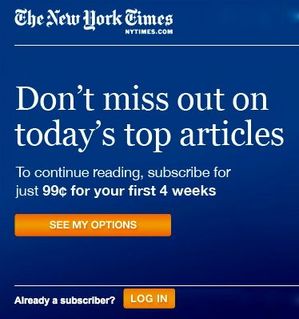The gift: Balancing what's free on the sharp edge of a paywall

THE PAY WALL: After readers have read 10 free-of-charge New York Times articles in a month, this blue rectangle appears in the center of the computer screen ending the free ride. Next month, you can read 10 more articles for free. What do you think of such paywalls?
All that free content on the web? Who pays for that?
It’s a crucial topic for news organizations, as more and more of them erect paywalls that require readers to pay for access.
On one side, you have the notion that because people have grown accustomed to getting content for free on the internet, they have a right to continue to do so forever.
On the other side, you have the argument that journalism is a real job for which people ought to get paid, and it seems perfectly reasonable to make readers foot the bill.
It seems to be working. Last year, for the first time in its history, the New York Times made more money off of circulation than advertising, thanks mostly to rapid growth in paid subscribers to its website.
But what about all that other content that’s still free on the web (like Read The Spirit), created by writers, editors, artists, video producers and others who also are interested in making a living?
Why do they give it away for free? Maybe as readers, we should look at is as a gift.
“When done properly, gifts work like nothing else,” according to marketing guru Seth Godin, who’s been quoted here before. “Gifts have to be truly given, not given in anticipation of a repayment. True gifts are part of being in a community... and part of being an artist. Plus, giving a gift feels good.”
Does reading a post like this make you feel like part of a community?
Originally published on OurValues.org.

